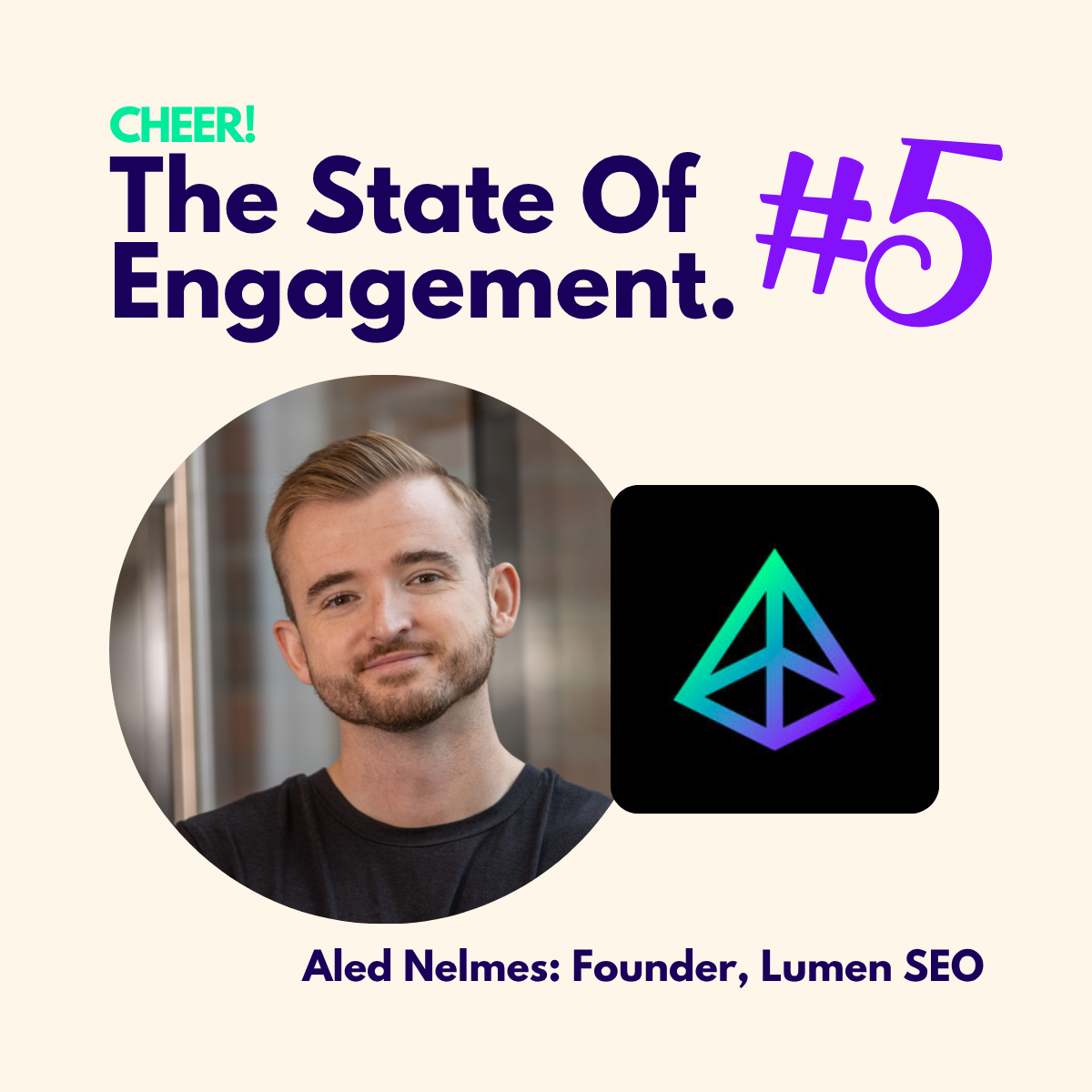The State of Engagement:
Aled Nelmes, Founder, Lumen SEO
This edition of TSOE is with Aled Nelmes – Founder of Lumen SEO. We examine their direct, practical and very human approach to Ownership, Engagement and Environment.
While his domain is digital visibility and search, Aled Nelmes lives and breathes people first. He’s built a company where ownership beats command, environment outpaces slogans, and short, sharp working weeks push the edge of what’s possible.
Lumen’s purpose is to help businesses grow through meaningful, sustainable SEO. Not by chasing vanity metrics, but by creating value that lasts. Aled extends that philosophy in how he runs his team: clarity over ambiguity, agency over micromanagement, and space for people to grow their own paths.
In our conversation, he digs deep into the roles of ownership, environment, feedback and work design, peeling back what really moves the needle for engagement, retention and performance.
What engages your employees most?
For Aled, the answer is ownership.
“Teamwork is good, but it can dilute responsibility. If someone OWNS a project, they get the full pride when it succeeds and the full learning when it doesn’t.”
Every month, he runs one-to-ones with one question: “If you could be doing more of one thing, what would it be?” One employee said she missed PR work, so she was encouraged to build a PR function from scratch. If she proves the impact, she could move from Account Assistant to Head of PR, even taking on ownership in the business.
The principle is simple: if you want more, try it, justify it, and we’ll try to make it happen.
What gives Aled the edge in attracting talent?
Aled points to two things:
-
Ownership and progression. From the start, job descriptions have said when we grow, you grow. Employees can follow the traditional route or create their own role by proving results.
-
Shorter working weeks. Moving first to a four-day week and then a 32-hour week has sharpened focus and consistency. Over the last year, the business has doubled, with 75% of new clients now arriving through referrals.
Flexibility in environment is another edge. Staff can choose office or home, with proper support in each space — from yoga and a stocked café at the office, to standing desks and headsets for home.
In your experience, what are employees looking for now?
“Not more perks. Not more money alone.”, says Aled. “They are looking for an environment where they can do their best work without sacrificing health or life outside it.
Ownership, space to try new things, and flexibility that actually works in practice are what stand out.”
Which part of EVP matters most to you personally?
EVP, or Employee Value Proposition, is the balance of what people give and what they get back. I like to break it down into seven pillars:
Brand & Purpose, Culture, Environment, Monetary, Prospects, Relationships, and Wellbeing.
So what is the most important to Aled?
Most people choose culture. Aled doesn’t.
“Culture is overrated. Environment is underrated.”
He sees culture as the story people tell about your business. Still useful, but surface-level. Environment, on the other hand, is what actually shapes behaviour and growth.
It’s the details: the setup, the tools, the atmosphere people see around them every day. If the environment encourages risk-taking, learning and ambition, people grow. If it rewards presenteeism or stagnation, they don’t.
For Aled, that’s where the real multiplier is. Culture might get the attention, but environment decides outcomes.
@ajbusinesscoach Focus on what actually matters. Taken from Episode 6 of the My Way Podcast with Aled Nelmes 🙌 Aled discusses how utilising time blocking is a game changer. If you’re constantly replying to emails and messages how can you expect to get any deep work done. (Book recommendation – Deep Work by Cal Newport) You can listen on Spotify & YouTube 🎧 #business #timemanagement #timeblocking #productivity #businessowners #businesscoach
What are your biggest people challenges right now?
It’s simple for Aled. Attracting talent.
Aled is frank about the gap between education and today’s work. “Schools and universities still run on batch production. They teach people to retain and repeat. But the skills we need now are human skills. Negotiation, assertiveness, problem solving.”
He often sees 200 applications, with many cut because they’re AI-written or at interview people are lacking the soft skills required – which is not their fault, but equally challenging in scaling a business.
Retention is easier, but letting go of people who no longer grow with the business is tough.
What advice then would you give to someone who might not have a strong network, or support to succeed?
“Stop waiting for the people around you to change. Start changing the people who are around you.”
Aled mentors Finn, a 17-year-old web developer from Penarth who wanted to do his own business for work experience but was told “no” by his school. Instead, Aled brought him into the office.
Finn now joins them on Fridays for what’s become an informal Startup Club. He works on his own projects, pitches his business in two-minute drills, and throws himself into conversations that most of his peers never get access to. His friends and even family sometimes don’t understand what he does – but here, in the right environment, he’s treated like a founder.
It’s uncomfortable for Finn at times, but that’s the point. Being surrounded by people who expect more and push you into new situations is what accelerates growth.
For Aled, Finn is living proof of his core belief: environment shapes outcomes.
Find out more about Lumen SEO
Follow Aled on Linkedin
Contact CHEER!
Click here for past editions of The State of Engagement

